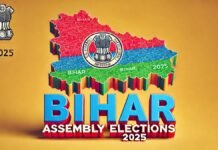
Key Points
- EC counters Rahul Gandhi’s ‘vote chori’ charge; calls it baseless and demands evidence or withdrawal within a week.
- EC says Bihar SIR is a transparent, legally mandated process; draft roll published Aug 1 with window for objections till Sept 1.
- CEC explains duplicate registrations don’t enable multiple voting; roll preparation and voting are governed by separate laws.
- INDIA bloc mulls impeachment motion against CEC Gyanesh Kumar; removal requires special majority like for a SC judge—an uphill task this session.
- EC uploads list of 65 lakh deletions within 56 hours of SC directive; urges objections before Sept 1 deadline.
New Delhi: The Election Commission dismissed Rahul Gandhi’s allegation of ‘vote theft’ as baseless, with CEC Gyanesh Kumar asking him to either submit evidence on affidavit or withdraw the remarks within a week, asserting the Commission would not be pressured by political attacks. The EC clarified that the Special Intensive Revision (SIR) in Bihar is a regular, legally mandated exercise with transparent verification by voters, BLOs, and party representatives, including signed documents and video testimonials.
Detailing timelines, the EC said Bihar’s draft electoral roll under SIR was published on August 1, and political parties have been asked to flag errors by September 1, after which corrections become difficult as the process moves to the voting phase. The Commission added it uploaded the list of 65 lakh deletions within 56 hours of the Supreme Court’s order, urging claims and objections within the remaining window.
EC’s Clarifications on Duplicate Entries and ‘House No. 0’
Responding to claims that multiple registrations enable double voting, the CEC underscored that roll preparation and the act of casting a vote are distinct processes under different laws; a voter can press the button only once at the booth, making “vote theft” on that count untenable. He also explained that “House No. 0” or missing house numbers appear where municipalities/panchayats have not numbered dwellings or in informal settlements, a long-accepted practice in rolls across states over decades.
Opposition Pushes Back; Impeachment Talk Gains Attention
Opposition parties in the INDIA bloc are considering moving an impeachment motion against the CEC in the ongoing Monsoon Session, framing the issue as fundamental to democratic integrity amid the Bihar SIR controversy. Constitutionally, a CEC can be removed only in the same manner as a Supreme Court judge via resolutions passed by a special majority in both Houses—making success difficult given current numbers and session timelines that end August 21. Some Congress leaders said all “democratic weapons” remain on the table, though formal discussions were still evolving as of Monday.
Political Stakes in Bihar’s SIR
The EC asserted that parties themselves have long sought correction of imperfections in rolls, and SIR began with Bihar on that basis, with timelines for other poll-bound states to follow when appropriate. The Commission reiterated its “open-door policy” for parties and voters alike and urged constructive participation rather than “spreading confusion,” saying over 7 crore Bihar voters are engaged in a credible, transparent exercise.
What Happens Next
- Parties have until September 1 to file claims and objections on the draft roll; the EC says post-deadline errors are harder to address.
- Any impeachment move would need initiation with requisite signatures, acceptance by the Presiding Officer, and passage by a two-thirds majority in each House a high constitutional bar unlikely to be met this session.
- The EC indicated SIR timelines for other states will be announced “at the appropriate time,” keeping focus on Bihar for now.



















































